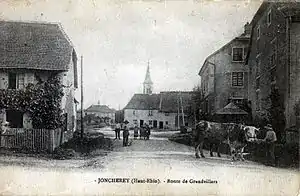Skirmish at Joncherey
The Skirmish at Joncherey was a clash in the Territoire de Belfort, on the border between France and Germany, and was the first military action of the Western Front of World War I. It occurred in the village of Joncherey near the 1871 French–German border in Alsace-Lorraine. The skirmish took place a day before the German declaration of war against France on 3 August 1914.
| Skirmish at Joncherey | |||||||
|---|---|---|---|---|---|---|---|
| Part of the outbreak of World War I | |||||||
 Photograph of Joncherey at the end of the 19th century | |||||||
| |||||||
| Belligerents | |||||||
|
|
| ||||||
| Commanders and leaders | |||||||
|
|
| ||||||
| Strength | |||||||
| 5 men | 7 men | ||||||
| Casualties and losses | |||||||
|
1 killed 1 injured |
1 killed 3 injured (1 captured) 1 missing 2 escaped | ||||||
 Joncherey | |||||||
Skirmish
At around 6:00 a.m. on 2 August 1914, Leutnant Albert Mayer and his small cavalry patrol illegally crossed the French border. They did not meet resistance, as the French had moved their troops back 10 km (6.2 mi) from the border, to avoid provoking the Germans and to show good faith in their attempts to avoid war.[1] Twice that morning as the German party advanced further into France, they exchanged fire with small groups of French infantry. At 9:50 a.m., Mayer slashed with his sabre at (but did not injure) a French sentry, who was on lookout at the entrance to Joncherey. Jules Andre Peugeot and four other soldiers were at their billet eating breakfast at the time. The daughter of the owner of the house came back inside from fetching water and reportedly said "The Prussians! The Prussians are coming!"[2]
Around 10:00 a.m., Peugeot and his four comrades went to arrest the Germans. Upon meeting, Mayer fired three shots at Peugeot. One hit his shoulder and Peugeot fired back as he was falling. Peugeot's comrades fired at the patrol with pistols. Mayer was shot in the stomach but seconds later was killed by a shot to the head. Peugeot stumbled back to the billet house where he died at 10:37 a.m.[3] Three more Germans were injured and one managed to escape for a few days, by hiding in the woods but was eventually captured. One of the German soldiers was never seen again and two escaped to Germany.[2]
References
- "Jules André Peugeot — Second Person Killed in WWI". www.silvermedals.net. Retrieved 25 September 2018.
- First To Fall For France
- The First to Fall: Peugeot and Mayer